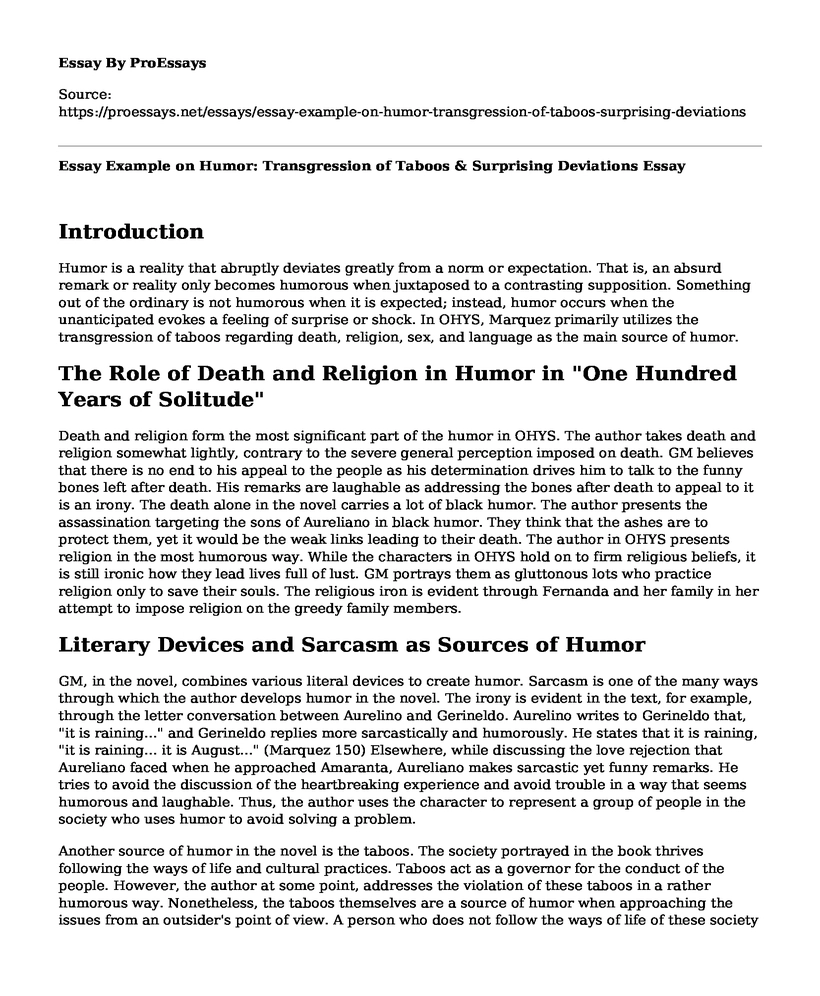Introduction
Humor is a reality that abruptly deviates greatly from a norm or expectation. That is, an absurd remark or reality only becomes humorous when juxtaposed to a contrasting supposition. Something out of the ordinary is not humorous when it is expected; instead, humor occurs when the unanticipated evokes a feeling of surprise or shock. In OHYS, Marquez primarily utilizes the transgression of taboos regarding death, religion, sex, and language as the main source of humor.
The Role of Death and Religion in Humor in "One Hundred Years of Solitude"
Death and religion form the most significant part of the humor in OHYS. The author takes death and religion somewhat lightly, contrary to the severe general perception imposed on death. GM believes that there is no end to his appeal to the people as his determination drives him to talk to the funny bones left after death. His remarks are laughable as addressing the bones after death to appeal to it is an irony. The death alone in the novel carries a lot of black humor. The author presents the assassination targeting the sons of Aureliano in black humor. They think that the ashes are to protect them, yet it would be the weak links leading to their death. The author in OHYS presents religion in the most humorous way. While the characters in OHYS hold on to firm religious beliefs, it is still ironic how they lead lives full of lust. GM portrays them as gluttonous lots who practice religion only to save their souls. The religious iron is evident through Fernanda and her family in her attempt to impose religion on the greedy family members.
Literary Devices and Sarcasm as Sources of Humor
GM, in the novel, combines various literal devices to create humor. Sarcasm is one of the many ways through which the author develops humor in the novel. The irony is evident in the text, for example, through the letter conversation between Aurelino and Gerineldo. Aurelino writes to Gerineldo that, "it is raining..." and Gerineldo replies more sarcastically and humorously. He states that it is raining, "it is raining... it is August..." (Marquez 150) Elsewhere, while discussing the love rejection that Aureliano faced when he approached Amaranta, Aureliano makes sarcastic yet funny remarks. He tries to avoid the discussion of the heartbreaking experience and avoid trouble in a way that seems humorous and laughable. Thus, the author uses the character to represent a group of people in the society who uses humor to avoid solving a problem.
Another source of humor in the novel is the taboos. The society portrayed in the book thrives following the ways of life and cultural practices. Taboos act as a governor for the conduct of the people. However, the author at some point, addresses the violation of these taboos in a rather humorous way. Nonetheless, the taboos themselves are a source of humor when approaching the issues from an outsider's point of view. A person who does not follow the ways of life of these society sees the taboos as something funny and laughable. The incest taboo in the novel seems to be one of the severe restrictions yet the characters at some point take it lightly and in a humorous way. Besides incest, there are other forms of sexual humor in OHYS. Funny and laughable aspects of sexual humor include the vivid description of the "itchy..." (Marquez 120) that the actors feel when they are about to have sex. Additionally, the ultimate end of sex is humorous. Nonetheless, GM in the novel is humorous by making fun of people and their careers, particularly the political class and the writers.
Works Cited
Marquez, Gabriel Garcia: One hundred years of solitude. Avons Book, New York, 1967.
Cite this page
Essay Example on Humor: Transgression of Taboos & Surprising Deviations. (2023, Apr 24). Retrieved from https://proessays.net/essays/essay-example-on-humor-transgression-of-taboos-surprising-deviations
If you are the original author of this essay and no longer wish to have it published on the ProEssays website, please click below to request its removal:
- Literary Analysis Essay on Danger for Odysseus
- Essay Sample - Invisible Man: Deception
- Literary Analysis of The Great Gatsby Essay by Scott F. Fitzgerald
- Torvald's View of His Wife and "A Woman's Place" - Critical Essay
- Evaluation of Mary Shelley's Frankenstein Essay
- Anthem - Literary Analysis Essay
- Can Poetry Be a Source of Knowledge? - Socrates' View - Essay Sample







